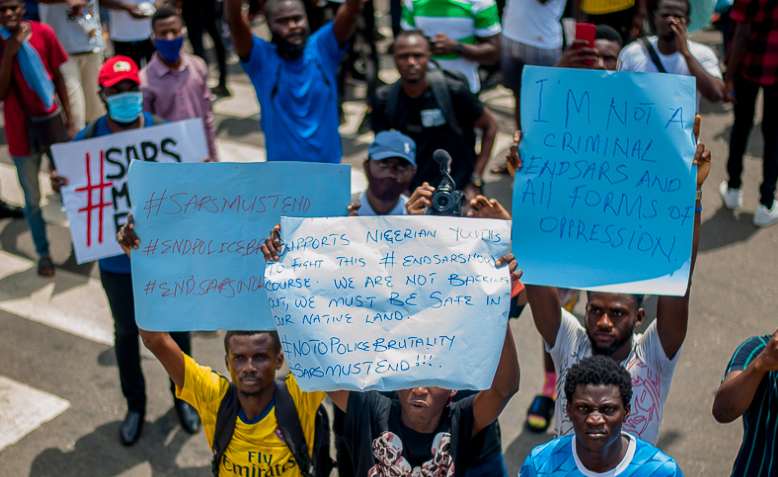 End Sars protest, Lagos, 13 October. Photo: Kaizenify / Wikimedia Commons / CC BY-SA 4.0 International, license linked at bottom of article
End Sars protest, Lagos, 13 October. Photo: Kaizenify / Wikimedia Commons / CC BY-SA 4.0 International, license linked at bottom of article
Protests against police brutality in Nigeria continue to escalate and have been met with horrific violence, writes Jamal Elaheebocus
The End Sars movement has swept Nigeria again in recent weeks. The movement has resurfaced after graphic footage was released online of unarmed operatives dragging two bodies across the street from a hotel in Lagos and shooting one of them dead two weeks ago. But it has been met with brutal force from the state.
License to kill
The Special Anti-Robbery Squad (Sars) was set up in 1992, supposedly to deal with violent crime and robbery. However, it has been found to be involved in extra-judicial killings, detainment without trial, and torture of detainees.
In 2010, a fifteen-year-old boy was shot at his high school by a Sars operative, after being supposedly mistaken for an armed robber. In the same year, Sahara Reporters found that Sars had unlawfully made $60 million in just eighteen months from roadblocks and extortions.
In 2016, Amnesty International released a report detailing the torture and detainment of civilians without trial by Sars officers. It also found that many of the officers involved in the torture of detainees were not held to account and were often transferred to other locations to avoid punishment.
This report has been followed by another report by Amnesty this year suggesting that Sars Officers have continued to commit human rights violations, despite the President’s promises to overhaul the unit in response to the violations. Since January 2015, there have been at least 82 cases of torture or execution.
Fighting back
The outbreak of street protests this year is not the first to happen. In 2018, protestors took to the streets after several cases of violence and murder of innocent civilians. The protests resulted in the acting president calling for the ‘overhaul’ of Sars but very little changed.
The protests this year have been spurred in part by the global spread of Black Lives Matter protests against police brutality and racist police. The movement has swept the US and the world, and protests continue in some cities, sparked by the death of George Floyd by police officers in May.
The End Sars protests this year have already had a significant impact. Tens of thousands of protestors have taken to the streets for over two weeks, with the largest protests in the capital Lagos.
On 11th October, the government announced that Sars would be dissolved with immediate effect. However, they also announced that it will be replaced by a Special Weapons and Tactics unit (SWAT).
Protests have continued, now voicing their opposition to Swat and more generally to police brutality in Nigeria. They have been met with severe violence from the police.
The government attempted to impose a 24-hour curfew on Tuesday in Lagos, with a population of 20 million, and several other regions to attempt to stop legitimate protests. This has understandably been largely ignored and crowds have refused to disperse in several regions. However, the state has also responded with much more violent action.
On Tuesday, at least 12 protesters was shot dead outside a toll gate in Lekki, just outside of the capital Lagos. The shooting was seen on an Instagram live video and witnesses have said more than 20 officers were seen firing live ammunition at the protesters.
The shocking violence deployed against unarmed protesters has killed at least 56 people over the last two weeks of protests – 38 of them on Tuesday alone.
The chief of police has sanctioned the deployment of riot police onto the streets and of police operatives outside prisons to try and stop the legitimate protests.
The police’s response only serves to prove the point of the protesters: police brutality, as in so many other countries, is rampant throughout the police and is a significant threat to people’s lives, especially those protesting for against the state.
Solidarity with End Sars protesters has come from across the world. #EndSars has topped the global trends on twitter and a number of prominent celebrities have voiced their support for the protesters.
In the US, UK and other countries, the Nigerian diaspora and the Black Lives Matter movement have organised solidarity demonstrations calling for an end to the violence against protesters in Nigeria and for their demands to be met. In London last week, hundreds of protesters marched to Downing Street, and will protesting again this Sunday from Marble Arch at 2pm.
Before you go
Counterfire is growing faster than ever before
We need to raise £20,000 as we are having to expand operations. We are moving to a bigger, better central office, upping our print run and distribution, buying a new printer, new computers and employing more staff.

